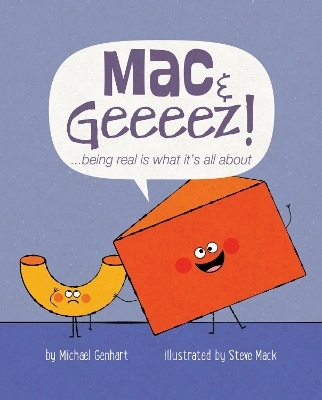
Mac & Geeeez!
Magination Press, (American Psychological Association) (Verlag)
978-1-4338-2723-5 (ISBN)
Mac and Cheese are best friends. When they are together, they get along really well. But when Cheese starts showing off, being silly, and even poking fun at others, he stops acting like himself. This annoys Mac. Mac helps Cheese realize that his friends like him just the way he is, and that being yourself is the best way to be.
Includes a Note to Parents, Caregivers, and Educators with advice and suggestions to support children being themselves.
From the Note to Parents, Caregivers, and Educators:
What Does It Mean to Be Yourself?
First, consider the phrase “be yourself” and talk with your child about what it means. Here are some things “being yourself” does not refer to:
Trying to be the center of attention (like Cheese) by showing off, making fun of others, telling not-so-funny jokes, and trying too hard to fit in.
Doing whatever you want (even if it’s wrong).
Being the best at everything you do.
Only thinking of yourself and not others.
Never failing or experiencing disappointment.
Being happy all the time.
Instead, here’s a sampling of what “be yourself” could mean:
Matching your inside feelings and thoughts with your outside words and actions.
Listening to what you like and dislike. It takes dedicated time to really know the answer to questions like “What do I think about that?” or “How do I feel when that happens?”
Respecting your own opinions while sincerely listening to different ideas.
Facing and coping with life’s basic challenges while trying to improve all the time.
Feeling comfortable in your own body and skin.
Not worrying about others who judge, tease, or get upset if you don’t do what they want.
Taking responsibility for your actions without blaming others.
Comparing who you are with that person you want to be, and not comparing yourself to others.
Showing the world the real you.
Being confident about your point of view.
Having the courage to say what you think out loud and proud.
“Being yourself” can mean many things; this is not a comprehensive list. Can you and your child think of any others?
Michael Genhart, PhD, a licensed clinical psychologist in private practice in San Francisco and Mill Valley, California, is the authorof numerous books for children including Ouch Moments and the Books for Nourishing Friendships Series. He lives with his family in Marin County. He received his BA in psychology from the University of California, San Diego and his PhD from the University of Maryland, College Park. Visit Dr. Genhart at www.michaelgenhart.com and follow him on Facebook: @picturebookauthor. Steve Mack is a freelance illustrator and has been illustrating professionally for the last decade. Steve has recently returned to Canada and his freelancing roots and now works for many clients. He has a small studio on a farm in the valley and lives with his wife and two small children. His children's books include Stickley Makes a Mistake, Peanut Butter & Jellyous...sometimes friendships get sticky, and The Grouchies. Visit him at www.stevemack.com or follow him on Facebook: @SteveMackIllustrator, Twitter: @steve_mack or Instagram @SteveMackIllustrator.
| Erscheinungsdatum | 07.10.2017 |
|---|---|
| Reihe/Serie | Books for Nourishing Friendships Series |
| Illustrationen | Steve Mack |
| Zusatzinfo | full-color illustrations |
| Sprache | englisch |
| Maße | 203 x 254 mm |
| Themenwelt | Kinder- / Jugendbuch ► Sachbücher |
| ISBN-10 | 1-4338-2723-9 / 1433827239 |
| ISBN-13 | 978-1-4338-2723-5 / 9781433827235 |
| Zustand | Neuware |
| Haben Sie eine Frage zum Produkt? |
aus dem Bereich


